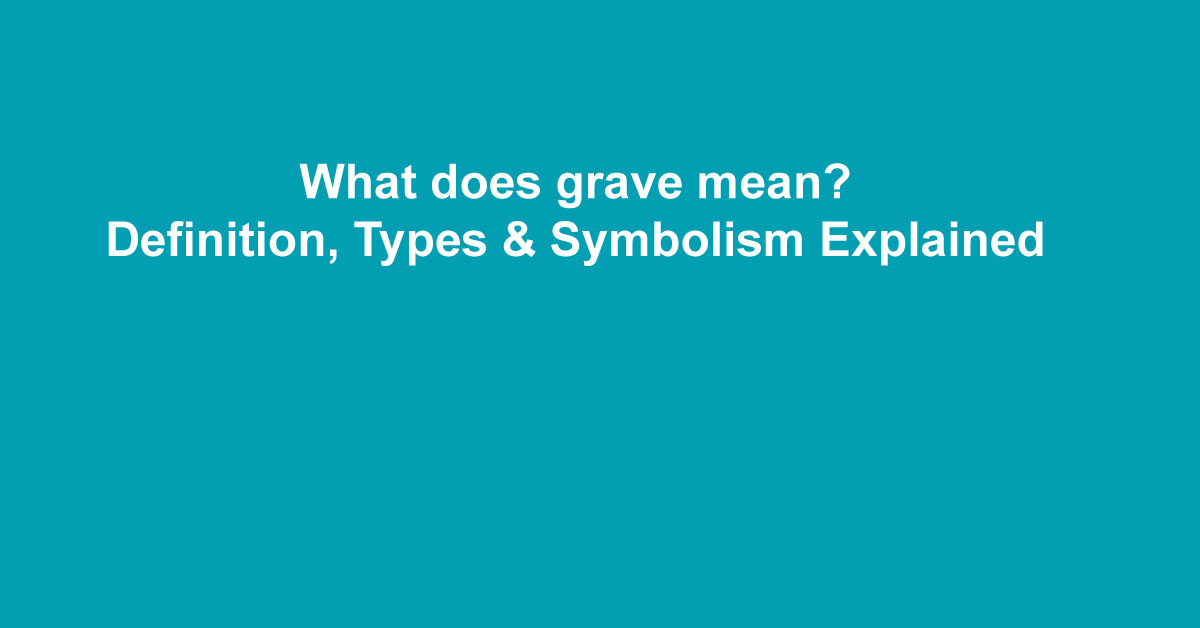What Does Grave Mean?
What does grave mean? Definition, Types & Symbolism Explained, A grave is more than just a physical space where someone is buried it’s a cultural, emotional, and historical marker that represents remembrance, respect, and legacy. In this article, we’ll explore the definition of a grave, its types, its significance in different cultures, and commonly used grave-related terms.
What is a Grave? (Simple Definition)
A grave is a specific place, usually in the ground, where the body of a deceased person is buried. It often includes a headstone or marker that displays the person’s name, birth and death dates, and sometimes a message or epitaph.
Origin and Meaning of the Word “Grave”
-
The word “grave” comes from the Old English “græf”, which means “a ditch or trench”.
-
In modern English, it refers both to a burial site and metaphorically to something serious or solemn (e.g., a grave situation).
Types of Graves
There are several types of graves, depending on cultural practices, geography, and religion:
1. Standard In-Ground Burial
-
Most common form
-
Includes a coffin or casket, buried several feet underground
2. Family Plot
-
A group of graves belonging to members of a single family
-
Often located together in a cemetery
3. Unmarked Grave
-
A grave with no headstone or visible marker
-
Used in historical, military, or poverty-related burials
4. Mass Grave
-
A burial site with multiple people, often linked to war or epidemics
What Is Usually Placed on a Grave?
-
Headstone (tombstone): Displays name, birth/death dates, epitaph
-
Flowers: A sign of respect and remembrance
-
Grave markers: Crosses, stones, or cultural symbols
Symbolism of the Grave
-
Represents end of life, memory, and respect for the dead
-
In many cultures, visiting a grave is a way to maintain a connection with ancestors
-
In literature and media, a grave can symbolize finality, loss, or peace
Cultural Views on Graves
| Culture / Religion | Burial Tradition |
|---|---|
| Christianity | In-ground with headstone |
| Islam | Body laid on right side, facing Mecca |
| Hinduism | Cremation is more common, but graves may exist |
| Judaism | Simple graves with a focus on humility |
| Ancient Egypt | Elaborate tombs like pyramids |
FAQs – What Does Grave Mean?
Q: What is the literal meaning of grave?
A: A place where a dead person is buried in the ground.
Q: What is the difference between grave and tomb?
A: A grave is usually underground; a tomb is often an above-ground structure like a crypt or mausoleum.
Q: Is “grave” used in other ways?
A: Yes, “grave” can also mean serious or solemn, like in the phrase “grave danger”.
Q: What is the origin of the word “grave”?
A: It comes from Old English “græf”, meaning a ditch or trench.
Final Thoughts
Understanding the meaning of a grave helps us appreciate not just the physical resting place, but also the emotional and cultural weight it carries. Whether you’re researching for genealogy, history, or personal reasons knowing what a grave means is the first step in honoring those who came before us.






